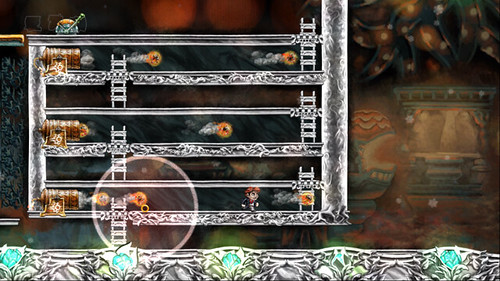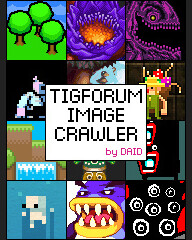Braid Released For Mac
By: Brandon McCartin (BMcC)
On: May 20th, 2009

A quick one, for all you Apple eaters: Award winning, time-bending puzzle-platformer Braid has been released for the Mac! You can find it here, at Greenhouse, with a free demo and everything.
A lot has been said about this fine little game, but I thought I’d throw in my two cents, before it’s too late. (After the jump.)
I’ve played through it a number of times now, and really believe Braid is a landmark game. Not just in the realm of “indie” games, but interactive software (or whatever you want to call it) as a whole. It pushes forward in so many ways, particularly in (Jon’s favorite, ha) unifying the naturally divergent forces of Story and Gameplay, while still, at its core, being a wonderfully designed, approachable Game. That’s actually what surprised me most about Braid, at least at first — the “artsy” stuff is there, yes, but strip it all away and you’ve still got a unique, polished, challenging videogame to play. Impeccably designed. (Not to mention that David‘s art also makes it one of the most lovely games I’ve ever seen in motion.) Anyway, yeah, suffice it to say I find it all pretty inspiring!
Can’t wait to see what Mr. Blow comes up with next. (Braid 2?)
-
http://www.glaielgames.com Glaiel Gamer
-
http://b-mcc.com// BMcC
-
Malasdair
-
Kenzya
-
http://www.glaielgames.com Glaiel Gamer
-
Kenzya
-
http://b-mcc.com// BMcC
-
Kenzya
-
Anarkex
-
http://b-mcc.com// BMcC
-
Some Guy
-
Ezuku
-
http://b-mcc.com// BMcC
-
http://b-mcc.com// BMcC
-
http://lumberingdream.com/ !CE-9
-
http://0xdeadc0de.org Eclipse
-
johhny
-
raigan
-
raigan
-
RazputinOleander
-
http://b-mcc.com// BMcC
-
http://b-mcc.com// BMcC
-
Connor Carpenter
-
Anarkex
-
http://b-mcc.com// BMcC
-
raigan
-
Kobel
-
http://b-mcc.com// BMcC
-
xerus
-
http://b-mcc.com// BMcC
-
Jeff
-
Pretentious
-
toastie
-
raigan
-
http://chaoseed.com/garden John Evans
-
Anthony Flack
-
Anarkex
-
Sninnyer
-
http://b-mcc.com// BMcC
-
http://b-mcc.com// BMcC
-
Anarkex
-
Anthony Flack
-
Malasdair
-
Anthony Flack
-
johhny
-
fydo
-
http://infiniteammo.ca Alec
-
raigan
-
Tom Brouws
-
franp

